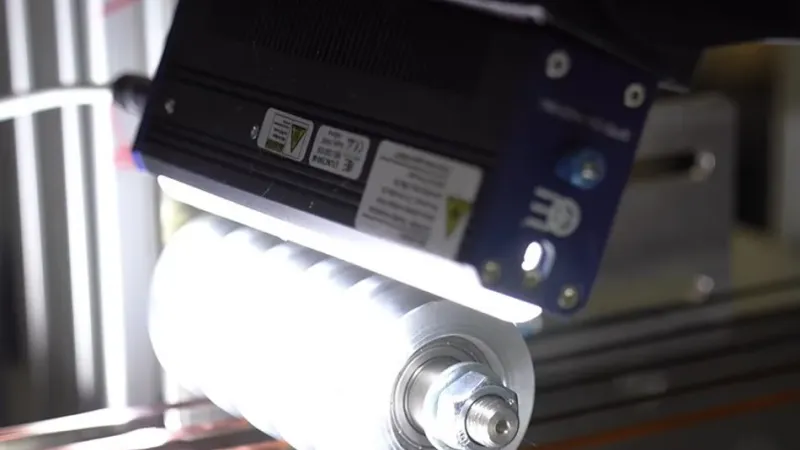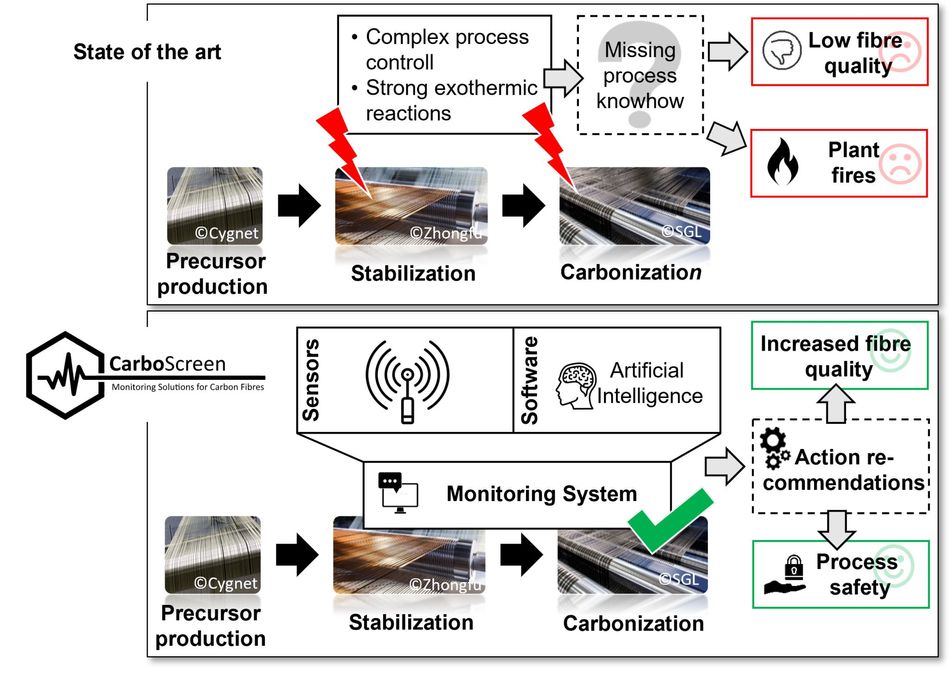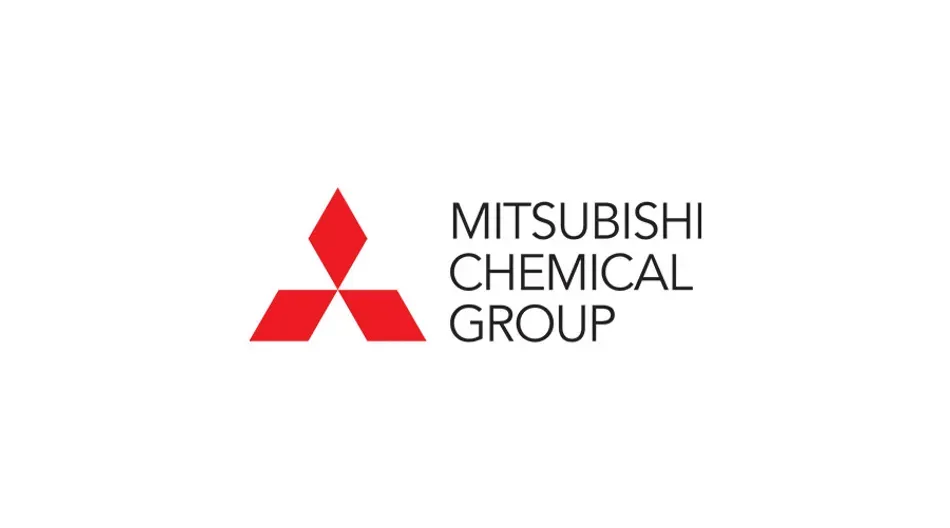Composite Engineering Challenge Community Winner: Interview with Felix Pohlkemper of CarboScreen
The Composite Engineering Challenge, organized by the Mitsubishi Chemicals Group and Wevolver, invited innovators, entrepreneurs, startups, and scaleups to submit projects that make use of fiber-reinforced composites.

Image credit: CarboScreen
Composite Engineering Challenge
The Composite Engineering Challenge invited innovators, entrepreneurs, startups, and scaleups to submit projects that make use of fiber-reinforced composites.
The challenge received submissions from over 20 countries. The jury selected ten finalists and three special recommendation projects.
The Wevolver Community voted to select their favorite finalist who will be brought to the attention of senior management of MCG and the Venture group of MCG. The winner fo the 2023 Composite Engineering Challenge Wevovler Community Vote is CarboScreen.
CarboScreen develops and produces a sensor-based monitoring system with AI-based software. It links sensor data to process know-how to optimize production and increase fiber quality. This has the potential to double production speed and reduce downtime, resulting in an increase in sales and enabling the use of CFs in mass markets.
Wevolver sat down with Felix Pohlkemper of CarboScreen to ask him about their tech, its impact, and what winning the community vote means to him and the team.
Wevolver: Talk us through the CarboScreen concept. What is the tech and how does it work?
Pohlkemper: To understand why CarboScreen shines, it's important to first understand the current state of carbon fiber production.
Reinforcing fibers - such as carbon fibers - can only develop their full potential if they aren't damaged during production and processing. However, the current state-of-the-art optical monitoring of these processes is not good enough for most fiber production processes, such as detecting structural defects.
This deficit is particularly evident in the complex carbon fiber manufacturing process, where there currently aren't any sensor systems available for monitoring the quality of carbon fibers. This leads to reduced fiber quality and, in extreme cases, plant fires.
In order to be able to guarantee sufficient product quality, the maximum production speed of a carbon fiber line is limited to approximately 12-15 meters per minute. In other words, the production lines are only being used to 30-40% of their potential, due to process limitations. This restriction of production makes the final product more expensive. Averaging about €20 per kilo - these fibers are well above the tolerable cost for mass applications.
How does CarboScreen stand out?
The business model of CarboScreen includes the development, production and sale of a multimodal, sensor-based monitoring system to carbon fiber manufacturers. In addition to mechanical fiber damage, the system is also able to monitor relevant parameters, such as the degree of stabilization during the process.
The core competencies lie in the adaptation of various sensor systems to the carbon fiber manufacturing process and the development of an AI-based software platform.
The software platform links the measured sensor data with process know-how and derives recommendations for action for the plant operator. The combination of sensor, fiber and process know-how to derive recommendations for the customer is the company's unique selling point.
Wevolver: How do you think CarboScreen's tech will impact carbon fiber production?
Pohlkemper: The monitoring systems will enable an increase in the production speed of carbon fiber production. By doubling the production speed alone, it is possible to achieve an increase in sales of up to €37.5 million per year per plant for users of the CarboScreen technology.
Long term, an increase in production volume per plant results in a significant reduction in the carbon fiber price. Industry experts are sure that this will enable the large-scale use of carbon fibers and their composites in mass markets such as the automotive sector.
The CarboScreen technology is paving the way for cost-effective, lightweight carbon fiber solutions in numerous industrial sectors such as e-mobility, civil aviation and renewable energies. CarboScreen also offers customers the possibility to monitor their produced fibers holistically and to market them certified to their end customers.
Carbon fiber production is the ideal entry market to develop and test this monitoring system due to its high added-value and sophisticated process control. However, we are planning to expand the portfolio to other markets, such as the glass fiber or man-made fiber industry.
Wevolver: Do you see a potential partnership with the Mitsubishi Chemical Group venture team on the horizon? What do you hope this will look like?
Pohlkemper: We are focusing heavily on our positioning in the market and the development of further partnerships. For the continued development of the technology, cooperation with various subsidiaries of the Mitsubishi Group would be greatly welcomed.
Specifically, we are pursuing contacts who could be either potential customers (carbon fiber manufacturers/ processors), or potential partners (sensor manufacturers). For example, a partnership with the carbon fiber manufacturing department of Mitsubishi Chemicals would be useful for us. The partnership could go from a simple exchange to joint developments.
Furthermore, the use of the Line Scan Bar from Mitsubishi Electric for the detection of macroscopic defects would be advantageous. We have already developed a corresponding monitoring system with another camera system. If there is interest, we would be happy to present the topic again to the respective departments.
Wevolver: What does the future hold for CarboScreen? Where do you plan to take the tech in the next 6-12 months?
Pohlkemper: CarboScreen's value proposition is to offer holistic monitoring and control of carbon fiber production for increased process reliability and productivity. For this purpose, CarboScreen develops and sells modular monitoring systems specially designed for carbon fiber production lines with AI-supported evaluation software.
In addition, consulting services on all aspects of carbon fiber production and the market are offered. The market entry will take place in cooperation with RWTH Aachen University and the Institut für Textiltechnik, respectively.
The monitoring systems will then be distributed via two different sales channels. On the one hand, Onejoon, the leading plant manufacturer for carbon fiber equipment, will offer the monitoring system as an upgrade for new or existing production plants. On the other hand, direct sales will be made to carbon fiber producers who want to upgrade their plants.
Interesting markets are located in particular in the growth countries China, Saudi Arabia and Turkey. Since the company founders have already worked with a large number of these companies (such as Saudi Aramco, Dow Aksa, SABIC), the chances of success for marketing are very good. Initial talks have already taken place.
By combining process and sensor know-how with good networking within the carbon fiber industry, CarboScreen can offer customer-specific overall solutions and act broadly on the market at an early stage.
Initially, the upscaling of the technology, the validation of the product and the marketing of the monitoring systems will be driven forward within the framework of the ongoing research project.
After the foundation of CarboScreen in 2023 and after completion of the research project, the production of the first monitoring systems for laboratory and pilot plants will begin in 2025.
In addition to offering consulting services such as workshops, studies or process design, and licensing the software, we plan for sensor system sales to be the main source of income. It is assumed that the first delivered systems will be designed for laboratory and pilot plants.
We project that by 2029, our total revenue will be around €2.2 million.
Wevolver: What does winning the Wevovler community vote mean to you and the team?
Pohlkemper: Winning the Wevolver community award is a great honor for us. As the award was chosen by the community, it shows once again the relevance of the topic at the moment. A widespread use of carbon fibers, also in low-cost areas, is only possible in the long term, among other things, if the carbon fiber price is reduced significantly. We are convinced that our technology will make a major contribution to this.
Furthermore, we are very pleased that we can further increase the visibility of our idea through the award. At this point in time, the most important thing for us is to position ourselves in the market in order to find out what customers want on the one hand and to build fruitful partnerships on the other. The Wevolver Community Award offers the ideal prerequisite for this. We have already received the first enquiries.
Finally, we hope that the presentation of our idea will lead to a long-term cooperation with Mitsubishi.
About the sponsor: Mitsubishi Chemical Group Advanced Materials Division and Business Incubator Growth Garage
MCG Advanced Materials Division is a leading global manufacturer of high-performance materials in the form of semi-finished products and finished parts. The company has locations in 20 countries and more than 2,800 employees. Its specialty engineering thermoplastics and composites are superior in performance to metals and other materials and are used in a wide range of applications, primarily in the capital goods industry. The company is continuously developing new areas of applications in close cooperation with industry leaders in a wide variety of customer markets.
Growth Garage is the Business Incubator of the MCG Advanced Materials Division. Our mission is to support and grow new ideas using our technologies and advanced engineering materials to help tackle some of today's biggest engineering challenges. We are offering the opportunity for engineers and innovators to pitch us their ideas and receive manufacturing support and services.


